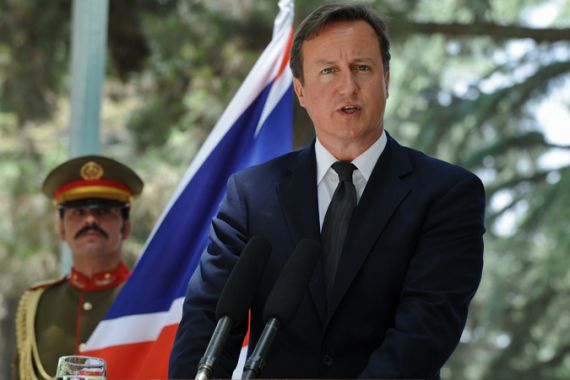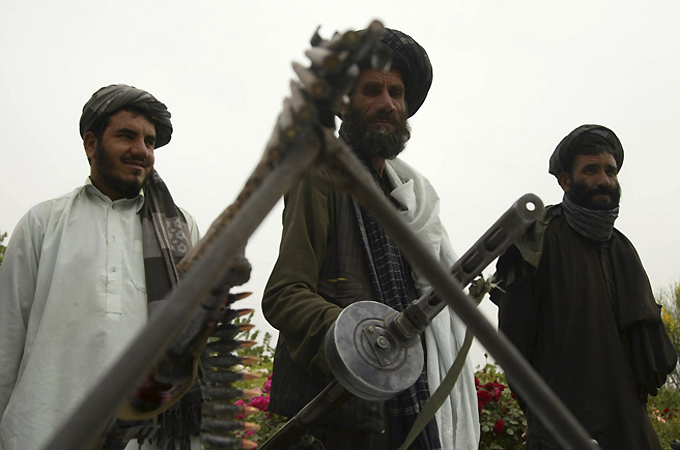Cameron: Future role possible for Taliban
British PM says group could play a part in Afghanistan’s future by laying down weapons and joining political process.

 |
| Some Taliban fighters, like these men in Herat, have reportedly handed over their weapons [REUTERS] |
British Prime Minister David Cameron has said that Afghanistan’s Taliban – currently fighting against British troops and other international coalition forces – could play a future role in the government of the country.
Western leaders have previously said they are negotiating with the Taliban in an attempt to forge a peace agreement, but Cameron’s statement is the most direct appeal yet to the group by a head of government.
“To the Taliban, my message is very clear. Stop bombing, stop killing, stop fighting, put down your weapons, join the political process and you can join the future of this country,” he said.
Cameron compared the situation in Afghanistan to the situation in Northern Ireland, where a decades-long sectarian conflict was ended by a peace agreement in 1998 that sees Irish republicans opposed to British rule in the province sharing power with unionists loyal to the UK.
“I’ve seen it in my own country, in Northern Ireland, where people who were involved in trying to kill, maim, and bomb civilians, police officers, army personnel, and even politicians, have actually become politicians themselves, involved in the governance of the country. It can happen,” Cameron said.
Reconciliation with the Taliban must be accomplished to secure Afghanistan’s long-term peace and security, but the Taliban must first lay down its arms and stop fighting, he said.
With US and UK forces set to withdraw by the end of 2014, the need to bring the Taliban into a peace agreement will become more pressing.
In June, while announcing his plan to withdraw tens of thousands of American troops over the next year, US President Barack Obama said a political settlement in Afghanistan would involve the Taliban. But he did not explicitly discuss them sharing power officially in government.
Taliban is ‘losing’
Speaking alongside Afghan President Hamid Karzai in Kabul, Cameron said Britain would also step up aid to Afghanistan as troops were gradually withdrawn and unveiled plans for a British Sandhurst-style academy to train Afghan army officers.
“You are losing this fight,” he said, referring to the Taliban, who have been battling foreign forces and Karzai’s government since they were ousted in late 2001.
“You are seeing your fellow Taliban members being killed in ever larger numbers, this will only continue. So you should give that up and join a political process,” Cameron said.
Last month, British Foreign Secretary William Hague said Britain was in contact with Taliban insurgents to find a political solution to the war. He did not give any details about the contacts.
Hague’s comments came days after Karzai confirmed for the first time the United States was in direct talks with the insurgents, but he said talks were not at a stage where the Afghan government was sitting down with the militants.
Britain, which has about 9,500 troops in Afghanistan, has long argued that only a political settlement can end almost a decade of fighting.
While foreign politicians and military commanders have also trumpeted recent security gains, particularly in the south of the country, the insurgency has shown little sign of abating.
In a sign of the fragile nature of the security gains, four foreign soldiers were killed in Afghanistan on Tuesday during Cameron’s visit. More than 2,500 foreign troops have died since 2001, at least 374 of them British.
Obama’s withdrawal plan would see 10,000 US troops leave this year and another 23,000 by September 2012, ending the “surge” he announced last year. There are about 100,000 US troops in Afghanistan.